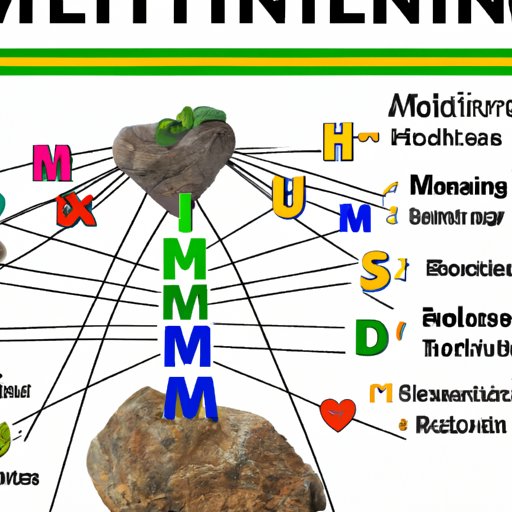Introduction
Minerals are essential nutrients that are needed in small amounts for the body to function properly. When you don’t get enough of these minerals from your diet, it can lead to a variety of health problems. In this article, we will explore what happens if you don’t have enough minerals, including identifying mineral deficiencies, nutritional interventions for treating them, and the role of minerals in optimal health.
Exploring the Link Between Mineral Deficiencies and Disease
When you don’t get enough of the essential minerals from your diet, it can lead to a variety of health problems. Common diseases associated with mineral deficiencies include anemia, osteoporosis, hypothyroidism, and diabetes. These conditions are often caused by a lack of iron, calcium, iodine, or magnesium, respectively. It’s important to note that minerals interact with other nutrients, such as vitamins and proteins, to ensure optimal functioning in the body.

How to Identify Mineral Deficiencies
The signs and symptoms of mineral deficiencies can vary depending on the type and severity of the deficiency. Common signs and symptoms include fatigue, muscle weakness, hair loss, brittle nails, and poor appetite. It is recommended to consult your doctor for medical tests to determine whether you have a mineral deficiency. These tests can include blood tests, urine tests, and hair analysis.

Nutritional Interventions for Treating Mineral Deficiencies
Treating mineral deficiencies requires incorporating foods rich in essential minerals into your diet. Foods high in iron include red meat, poultry, fish, beans, lentils, spinach, and nuts. Calcium-rich foods include dairy products, leafy greens, fortified cereals, and canned salmon. Iodine is found in seafood, dairy products, eggs, and iodized salt. Magnesium is found in legumes, nuts, seeds, and leafy greens. Additionally, supplements may be beneficial for those with severe deficiencies.

The Role of Minerals in Optimal Health
Minerals are essential for optimal health and wellbeing. They are necessary for a wide range of bodily functions, including maintaining healthy bones and teeth, regulating metabolism, and supporting proper nerve and muscle functioning. For example, calcium helps build strong bones and teeth, while magnesium helps regulate blood sugar levels and relaxes muscles.
The Benefits of Supplementation for Mineral Deficiencies
For those with severe mineral deficiencies, supplementation may be beneficial. There are many types of supplements available, including multivitamins, trace mineral formulas, and single-mineral supplements. Supplements can help increase your intake of essential minerals, but it’s important to speak to your doctor first to determine which type is best for you. Additionally, it’s important to note that taking too much of certain minerals can be harmful, so it’s important to stick to the recommended dosage.
Creating a Balanced Diet to Ensure Adequate Intake of Minerals
In addition to supplements, eating a balanced diet is key to ensuring adequate intake of minerals. Tips for eating a balanced diet include eating a variety of fruits and vegetables, whole grains, lean proteins, and healthy fats. Additionally, it’s important to limit processed foods and added sugars. Additionally, it’s important to read nutrition labels to ensure that you are getting enough of the essential minerals. If you are unsure, it’s best to speak to your doctor or a registered dietitian.
Conclusion
In conclusion, minerals are essential for optimal health. When you don’t get enough of these minerals from your diet, it can lead to a variety of health problems. To treat mineral deficiencies, it’s important to eat a balanced diet rich in essential minerals and consider supplementing if necessary. By ensuring adequate intake of minerals, you can experience the full benefits of optimal health.
(Note: Is this article not meeting your expectations? Do you have knowledge or insights to share? Unlock new opportunities and expand your reach by joining our authors team. Click Registration to join us and share your expertise with our readers.)
